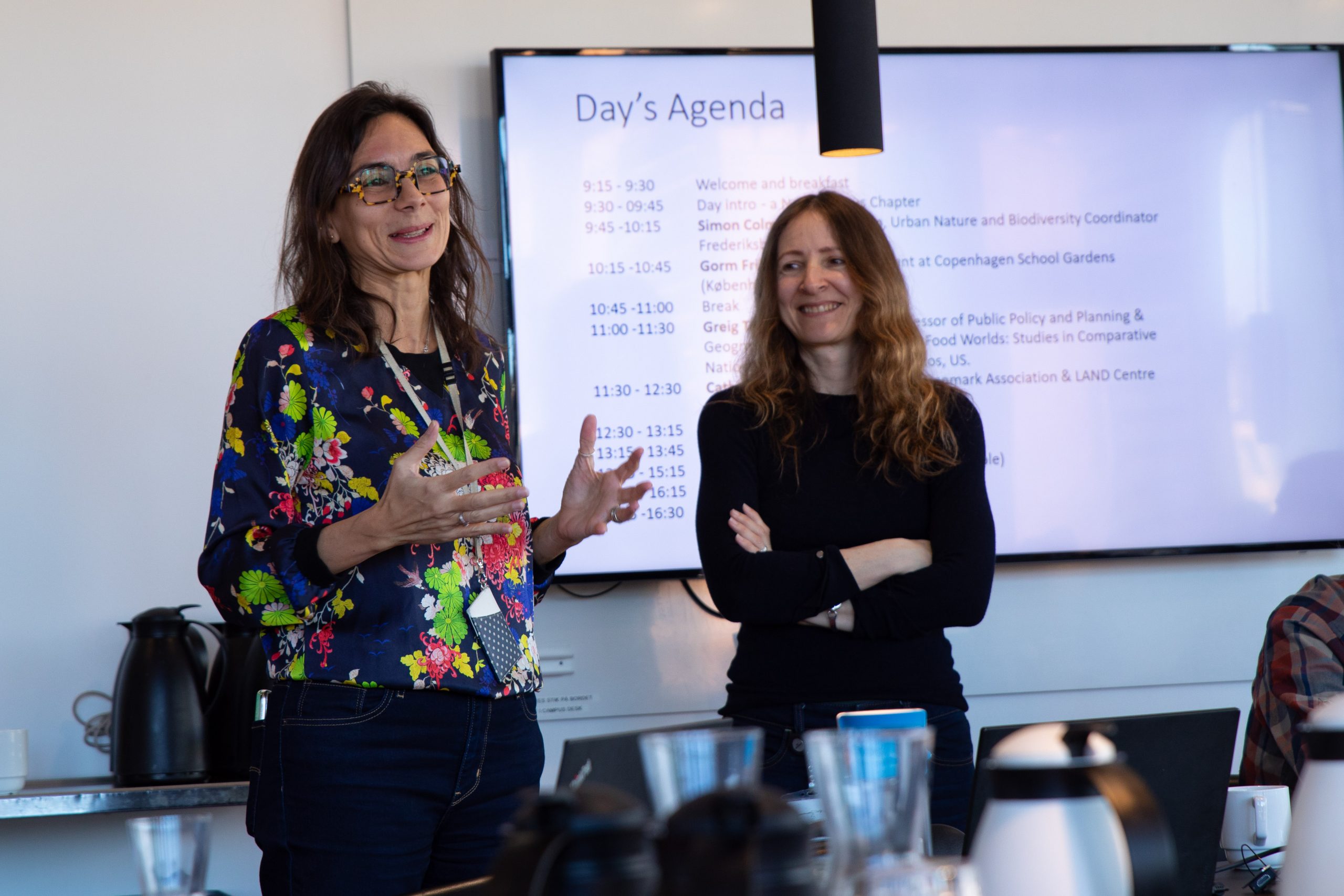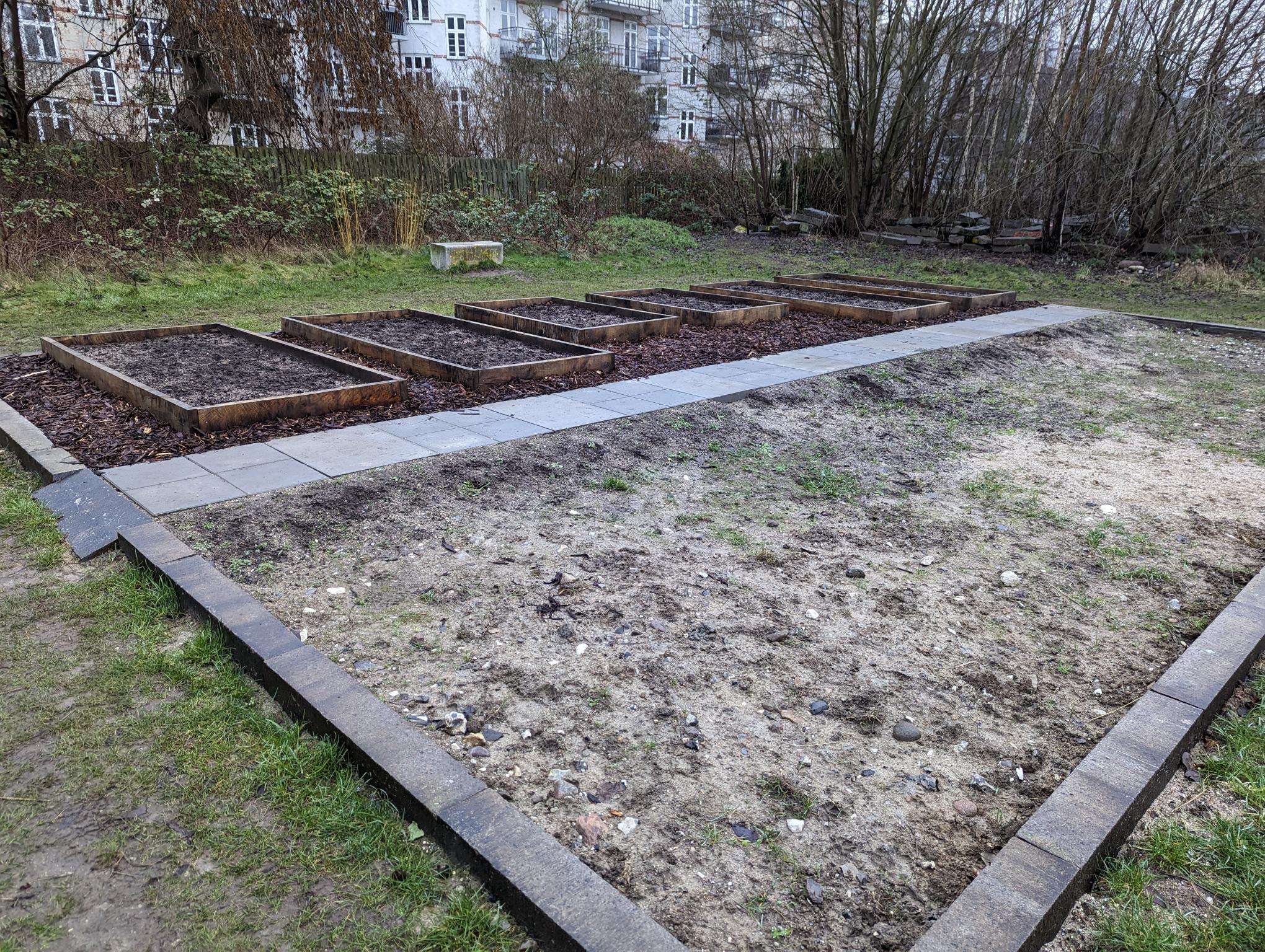A permaculture garden – ‘Permahaven’ – located on the CBS campus, opposite the Kilen building and very close to Fasanvej Metro Station. Permahaven serves as a hub for learning and communicating about sustainability where the local community can share their knowledge among themselves and contribute to increasing biodiversity and well-being in the municipality, side by side with CBS students and staff. The overall aim is to offer a means for CBS to strengthen its efforts to ‘walk the talk’ when it comes to practising sustainability and biodiversity in everyday campus life, and to offer educational opportunities in these areas.
Urban gardening is a growing movement worldwide, offering multiple environmental and social benefits. These include enhanced biodiversity in cities, greater energy efficiency in buildings, production of locally-grown, organic vegetables, integration of local community both as producers and consumers, enhanced wellbeing, and learning opportunities. Permaculture principles and tools are increasingly being used to support urban gardening projects in Denmark, and universities beyond Denmark, notably in the US and Canada, are also drawing on permaculture to design campus initiatives to increase sustainability, diversity and wellbeing (e.g. initiative at UMass Boston). We therefore believe that permaculture offers an ideal and inspiring environmental design framework to create this cutting-edge sustainability and biodiversity learning environment at CBS.
The term ‘permaculture’ stands for ‘permanent agriculture’, and was coined by Bill Mollison in 1978, who defined it as follows:
“The conscious design and maintenance of agriculturally productive systems which have the diversity, stability, and resilience of natural ecosystems. It is the harmonious integration of the landscape with people providing their food, energy, shelter and other material and non-material needs in a sustainable way.”
Permaculture offers a holistic framework for creating regenerative ways of living that are based on observing, imitating and working with nature rather than against it, in order to enhance resilience, diversity, productivity and stability (Hopkins 2020; Permaculturenews.org 2020). Although permaculture supports, and is often associated with, the term ‘sustainability’, permaculturists generally prefer the concept of regeneration, which captures the goal to give back to the ecosystem around us at the same time as taking care of our own needs; and on improving the current state of affairs, whether this be biodiversity, the quality of the soil or the degree of wellbeing in a community.
Permaculture advocates three overarching ethics: earth care, people care, and fair share, and twelve design principles – the petals of the so-called ‘permaculture flower’ (see Figure 1). Ultimately, the goal is to foster responsible cultivation, production and consumption through a whole-systems approach that embraces technology and scientific experimentation and favours ‘closed-loop’ approaches that ‘turn waste into resources and problems into solutions’ (Barth 2016).
Figure 1: The Permaculture Ethics and Applied Areas

The vision for the Permahaven is to create a regenerative space for CBS students, faculty and Frederiksberg local residents, as well as a hub for learning and disseminating knowledge about biodiversity and regenerative social and environmental practices, inspired by the above-mentioned permaculture principles. Permahaven will also be designed to support, Frederiksberg Municipality’s biodiversity strategy (https://www.frederiksberg.dk/sites/default/files/meetings-appendices/3092/Punkt_164_Bilag_5_bilag_5__Strategi_for_bynatur_og_biodiversitet_version_3_med_track_changes.pdf), and the Permahaven coordinators are in dialogue with the municipality to achieve that end. Frederiksberg Municipality has developed a set of very clear and practical strategies specifically to enhance biodiversity on the CBS campus, and to thereby link CBS in a ‘green corridor’ with other green areas in the municipality – green corridors being crucial for biodiversity support. Permahaven will be integrating these strategies within the garden area, thereby also hopefully inspiring initiatives to develop the rest of the campus in this direction as well.
A design workshop was held on 4th March, where different groups of participants (students, faculty, representatives from Frederiksberg municipality and others) worked collaboratively on a design for Permahaven.
More from the event



Permahaven provides hands-on learning opportunities with a wide range of permaculture perspectives, practices and tools that are scientifically proven to support biodiversity. We hope ultimately to train and engage student and local resident volunteers as teachers who disseminate knowledge about these issues more widely in their networks and communities. Concrete examples of common permaculture practices are:
- No-dig methods that don’t disturb soil life (e.g. raised beds, mulching)
- Harvesting sunlight, water
- Bee-keeping and creation of habitats to support other pollinators
- Covering (mulching) soil with plants or organic materials
- Addition of carbon-rich materials to the soil (e.g. wood chips, compost, straw)
- Using natural fertilisers, such as animal manure, instead of artificial fertilizers
- Recycling kitchen and garden waste to make compost
- Using brushwood fences in the landscape to support biodiversity
- Rewilding – leaving a corner of the area wild, letting grass grow into a meadow
- Growing food (instead of just lawns, etc).
The garden will also function as an integration/outreach hub that seeks to open the campus up and make it more ‘porous’ to local residents. In this spirit, CBS Permahaven is envisioned as a holistic means to support CBS educational innovation, notably in the area of transformative learning and the Nordic Nine principles. It also aims to further key goals outlined both in CBS Campus Sustainability goals 2020-25, notably improving well-being and performance both among faculty and students; sustainably managing CBS’ food system, including supporting urban gardening, locally grown food, waste reduction, developing learning opportunities around food-related issues; and rethinking the campus as a ‘living laboratory for sustainability to support greater knowledge sharing’ and emissions reduction (see: https://www.cbs.dk/files/cbs.dk/cbs_campus_sustainability_strategy.pdf).